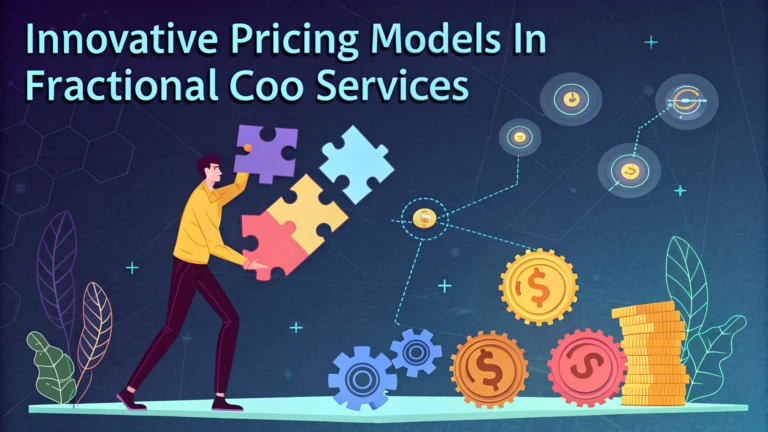Fractional COO services have transformed how businesses access executive leadership, making pricing models increasingly sophisticated and flexible.
Small and medium enterprises can now tap into high-level operational expertise without the financial burden of a full-time executive salary.
This article explores innovative pricing structures that make fractional COO services accessible while ensuring value for both service providers and clients.
Common Pricing Models
- Retainer-Based: Monthly fixed fee for agreed-upon hours and deliverables
- Project-Based: One-time fee for specific initiatives or transformations
- Hourly Rates: Flexible payment structure based on actual time spent
- Performance-Based: Compensation tied to achieving specific business outcomes
Value-Based Pricing Structures
Value-based pricing aligns the fractional COO’s compensation with measurable business improvements.
| Metric | Pricing Component |
|---|---|
| Revenue Growth | % of increased revenue |
| Cost Reduction | Share of savings achieved |
| Operational Efficiency | Bonus for hitting KPI targets |
Hybrid Pricing Options
Many fractional COOs combine multiple pricing elements to create customized solutions.
- Base + Performance: Fixed monthly retainer plus performance bonuses
- Tiered Services: Different pricing levels based on service scope
- Equity + Cash: Reduced cash compensation with stock options
Choosing the Right Model
Select a pricing model based on your business stage, goals, and budget constraints.
- Startups: Consider equity-based or project-based models
- Growth Stage: Explore retainer + performance hybrid options
- Mature Companies: Value-based or traditional retainer models work well
Cost-Benefit Analysis
| Service Level | Typical Monthly Investment | Best For |
|---|---|---|
| Basic (10-15 hours) | $2,500-5,000 | Small businesses, specific projects |
| Standard (20-30 hours) | $5,000-10,000 | Mid-sized companies, ongoing operations |
| Premium (40+ hours) | $10,000-20,000 | Large organizations, complex needs |
Making It Work For Your Business
Request detailed proposals from multiple fractional COO service providers to compare pricing structures.
- Define clear deliverables and expectations
- Establish measurable success metrics
- Include flexibility for scaling services up or down
- Review and adjust terms quarterly
For more information on fractional COO services, contact professional organizations like COO Society or Fractional Executive Alliance.
Implementation Timeline
A successful fractional COO engagement typically follows a structured timeline for optimal results.
First 30 Days
- Assessment of current operations
- Goal alignment and priority setting
- Development of action plans
- Initial reporting structure setup
60-90 Days
- Implementation of key initiatives
- Process optimization
- Team training and development
- Performance tracking systems
Technology Integration
Modern fractional COO services leverage technology platforms to enhance service delivery and tracking.
- Project Management Tools: Asana, Monday.com, Trello
- Communication Platforms: Slack, Microsoft Teams
- Performance Dashboards: Tableau, Power BI
- Document Sharing: SharePoint, Google Workspace
Maximizing ROI
| Focus Area | Expected Outcome |
|---|---|
| Process Optimization | 15-30% efficiency improvement |
| Team Performance | 20-40% productivity increase |
| Strategic Planning | Clear growth roadmap |
Strategic Partnership for Growth
Selecting the right fractional COO pricing model is crucial for long-term success. Focus on alignment with business objectives and scalability of services.
- Regular performance reviews
- Flexible contract terms
- Clear communication channels
- Measurable success metrics
Remember that the true value of fractional COO services extends beyond cost savings to include strategic guidance, operational excellence, and sustainable growth.
FAQs
1. What are the common pricing models for fractional COO services?
Typical models include hourly rates ($150-500/hr), monthly retainers ($2,000-15,000/month), project-based fees, equity compensation, and hybrid models combining multiple payment structures.
2. How does value-based pricing work for fractional COO services?
Value-based pricing ties compensation to specific business outcomes or KPIs, such as revenue growth, cost reduction, or operational efficiency improvements, with fees structured as a percentage of the value delivered.
3. What factors influence fractional COO pricing?
Key factors include industry expertise, scope of responsibilities, company size, time commitment, complexity of operations, geographic location, and the COO’s experience level.
4. Are there any success-based pricing models available?
Yes, success-based models include performance bonuses, milestone-based payments, and profit-sharing arrangements where the fractional COO’s compensation is partially tied to achieving specific business goals.
5. How does tiered pricing work in fractional COO services?
Tiered pricing offers different service levels (e.g., basic, premium, enterprise) with varying degrees of involvement, deliverables, and access to the fractional COO, allowing clients to choose based on their needs and budget.
6. What is the ROI calculation for fractional COO services?
ROI is typically measured by comparing the cost of services against operational improvements, cost savings, revenue growth, and efficiency gains achieved through the fractional COO’s involvement.
7. How do subscription-based models work for fractional COO services?
Subscription models offer ongoing operational support for a fixed monthly fee, often with different service tiers and minimum commitment periods, providing predictable costs for both parties.
8. What are hybrid pricing models in fractional COO services?
Hybrid models combine multiple pricing approaches, such as a base retainer plus performance bonuses, or hourly rates with equity compensation, offering flexibility and alignment of interests.
9. How do equity-based compensation arrangements work for fractional COOs?
Equity compensation can include stock options, restricted stock units, or direct ownership shares, typically ranging from 0.25% to 3% of company equity, often combined with reduced cash compensation.
10. What are the payment terms and structures typically offered?
Common payment structures include upfront deposits, monthly retainers paid in advance, milestone-based payments, and net-30 payment terms for hourly billing arrangements.
11. How are contracts typically structured for fractional COO services?
Contracts usually specify service scope, deliverables, time commitment, pricing model, payment terms, termination clauses, and performance metrics, with typical durations of 3-12 months.







